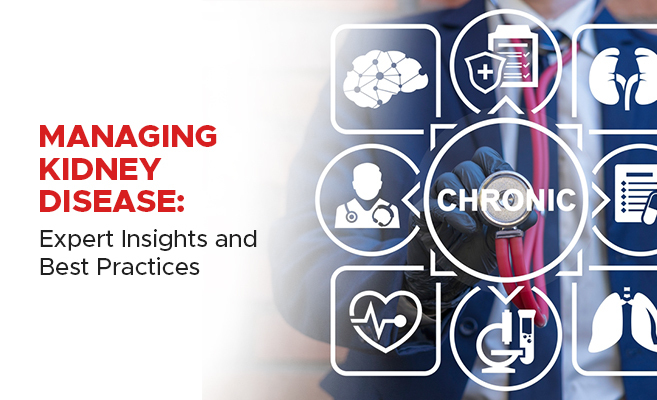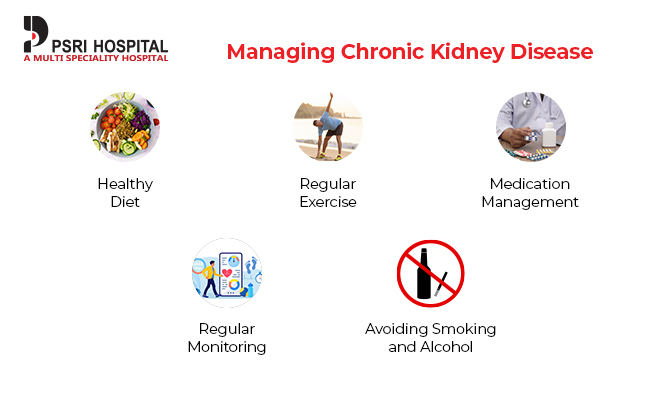Managing Kidney Disease: Expert Insights And Best Practices

Kidney disease is a significant health concern that impacts millions of people worldwide. Understanding how to manage this condition effectively can drastically improve your quality of life. This blog will provide valuable insights from experts and outline best practices for managing chronic kidney disease.
Whether you’re newly diagnosed or looking for ways to manage your condition better, this guide will help you navigate the challenges of kidney disease with confidence.
Understanding Chronic Kidney Disease
Chronic Kidney Disease (CKD) is a condition where the kidneys gradually lose their function over time. This can lead to waste buildup in the body, which can cause other health problems like heart disease, anemia, and bone disease. Early detection and proper management can slow the progression of the disease and improve the quality of life for individuals with CKD.
Managing Chronic Kidney Disease
The kidney specialist in Delhi NCR at PSRI Hospital says that managing CKD involves a combination of lifestyle changes, medications, and regular monitoring. Here’s how you can effectively manage the condition:

Healthy Diet
A balanced diet is essential for managing CKD. Here are some dietary tips:
- Limit Protein Intake: Excess protein can strain the kidneys. Opt for high-quality protein sources like lean meat and dairy in moderation.
- Control Blood Sugar: If you have diabetes, it’s important to keep your blood sugar levels in check.
- Reduce Sodium Intake: High sodium levels can increase blood pressure and worsen kidney disease. Avoid processed foods and use herbs for seasoning.
- Monitor Potassium and Phosphorus: High levels of these minerals can cause heart and bone problems. Eat low-potassium fruits and vegetables and avoid high-phosphorus foods like dairy and nuts.
Regular Exercise
Exercise helps control blood pressure, manage weight, and improve overall health. Aim for at least 30 minutes of moderate exercise, like walking or cycling, most days of the week.
Medication Management
Medications play a key role in chronic kidney disease treatment. Your doctor may prescribe:
- Blood Pressure Medications: To lower blood pressure and slow kidney damage.
- Diuretics: To help remove excess fluid and reduce swelling.
- Medications to Lower Cholesterol: High cholesterol can lead to heart disease, which is common in people with CKD.
- Medications to Treat Anemia: If CKD has caused anemia, you may need medications to increase red blood cell production.
Always take medications as prescribed and discuss any side effects with your doctor.
Regular Monitoring
Regular check-ups are vital for tracking the progression of CKD. Your doctor will monitor your blood pressure, kidney function, and overall health. Keeping a record of your test results and symptoms can help you manage the disease more effectively.
Avoiding Smoking and Alcohol
Smoking and excessive alcohol consumption can worsen CKD and increase the risk of other health problems. Quitting smoking and limiting alcohol intake are important steps in managing CKD.
Preventing Complications
Complications from CKD can include high blood pressure, heart disease, and bone problems. Here’s how you can prevent these complications:
- Manage Blood Pressure: Keep your blood pressure under control with medication, diet, and exercise.
- Monitor Heart Health: Regular check-ups and a healthy lifestyle can prevent heart disease.
- Maintain Bone Health: Take supplements if prescribed, and follow a diet that supports bone health.
When to See a Doctor
Regular medical visits are crucial for effectively managing chronic kidney disease. However, if you experience severe symptoms such as:
- Persistent swelling in the legs, feet, or ankles
- Sudden shortness of breath
- Severe fatigue or weakness
- Confusion or difficulty concentrating
Seek medical attention immediately at the best kidney hospital in Delhi NCR, as these could be signs of worsening kidney function.
Stages of Chronic Kidney Disease
CKD is divided into five stages, with stage 1 being mild and stage 5 being severe. The stages are determined by the glomerular filtration rate (GFR), which measures how well your kidneys are filtering waste from your blood. Understanding the stage of your CKD helps you choose the right treatment for chronic kidney disease.
- Stage 1: Normal or high GFR (90 ml/min or higher).
- Stage 2: Mild decrease in GFR (60-89 ml/min).
- Stage 3: Moderate decrease in GFR (30-59 ml/min).
- Stage 4: Severe reduction in GFR (15-29 ml/min).
- Stage 5: Kidney failure (GFR less than 15 ml/min).
Symptoms of Chronic Kidney Disease
In the early stages, CKD may not show any symptoms. As the disease progresses, symptoms may include:
- Fatigue and weakness
- Swelling in the feet and ankles
- Shortness of breath
- Frequent urination, especially at night
- Nausea and vomiting
- Loss of appetite
- Muscle cramps
If you experience any of these symptoms, it’s important to see a doctor for a proper diagnosis and to manage chronic kidney disease effectively.
Diagnosis of Chronic Kidney Disease
Diagnosing CKD typically involves several tests:
- Blood Tests: To check for levels of waste products such as creatinine and urea.
- Urine Tests: To detect abnormalities like protein or blood in the urine.
- Imaging Tests: To look for abnormalities in the kidneys.
- Biopsy: In some cases, a small sample of kidney tissue may be taken for examination.
Early diagnosis is crucial for effective chronic kidney disease treatment and management.
Conclusion
Managing chronic kidney disease requires a comprehensive approach that includes lifestyle changes, medications, and regular monitoring. By following these best practices and working closely with our kidney specialist in Delhi NCR, you can slow the progression of the disease and maintain a good quality of life. Early diagnosis and proactive management are key to effective chronic kidney disease treatment. Stay informed, stay proactive, and take control of your kidney health. Book an appointment today to know more.
FAQs
What is chronic kidney disease (CKD)?
Chronic kidney disease (CKD) is a condition where the kidneys gradually lose their ability to filter waste and fluids from the blood. This can lead to a buildup of harmful substances in your body. CKD often progresses slowly and can cause various health problems if not managed properly.
How can I tell if I have chronic kidney disease?
In the early stages, CKD often doesn’t have noticeable symptoms. As the disease progresses, you might experience symptoms like fatigue, swelling in your feet or ankles, frequent urination, and high blood pressure. It’s important to get regular check-ups, as blood and urine tests can detect CKD early on.
What lifestyle changes can help manage chronic kidney disease?
To manage CKD, you can make several lifestyle changes:
- Eat a healthy diet low in salt and protein.
- Exercise regularly to keep your blood pressure in check.
- Quit smoking and limit alcohol intake.
- Take prescribed medications as directed.
- Monitor your health with regular doctor visits.
- How is chronic kidney disease treated?
Chronic kidney disease treatment focuses on slowing the progression of the disease and managing symptoms. This may include medications to control blood pressure, manage diabetes, or reduce cholesterol levels. In more advanced stages, treatments might include dialysis or a kidney transplant.
Can chronic kidney disease be cured?
Currently, there is no cure for CKD, but early detection and proper management can slow its progression and improve your quality of life. Treatments and lifestyle changes can help control symptoms and prevent further damage to your kidneys.

 Book An Appointment
Book An Appointment Virtual Consultation
Virtual Consultation





